To celebrate the release of faux-documentary horror movie THE ATTICUS INSTITUTE, which arrives on DVD and Blu-Ray in the UK on 23rd March 2015, HCF spoke with lead actress Rya Kihlstedt (Dexter, Deep Impact, Home Alone 3), who stars as possession victim Judith Winstead in the film.
Find out how Rya got involved with The Atticus Institute, her thoughts on the filmmaking process and her method behind her performance as a possession victim in our exclusive interview below.
How did you get involved with The Atticus Institute and what attracted you to the project?
I got involved, as William Mapother (who stars as Dr. Henry West in the film) would say, “the old fashioned way” – we auditioned. The script was sent to me via my agent who attached a note saying “I’m not sure you’ll be interested in this, but take a look”. I’m not a horror film fan – I can’t sleep, I get freaked out – but there was something so interesting about this and the story and Chris’ voice as a writer that I was really intrigued. I had never read anything like this and I have a very good friend who is a horror fanatic. He’s a writer and that is his passion – his love is horror movies. I went in and met Chris and auditioned and thought “Chris is interesting. I like how he talks about this. I must say I’m intrigued.” Once you go in and start investing yourself and committing, you kind of get caught up. So I sent the script to my friend Ryan with a note in saying “Wow! Am I crazy?! I think there’s something really interesting here.” He got back to me within two hours and he said “You ABSOLUTELY have to do this!” and I thought, “Okay, alright. I’m not crazy. There’s something really fascinating here.”
I thought The Atticus Institute was an original take on the possession tale because most possession movies are quite repetitive with the teenage possession theme but this one was very different…
Yeah, that’s what I thought too. I confess to not having watched a lot of them and I actually did pull one to watch, before this all started, to use as reasearch but then I decided that was not a good idea. It was not going to help me. In some ways, I thought it was going to limit me because I thought that’s what so interesting about this is that it is a unique and different take and a different voice.
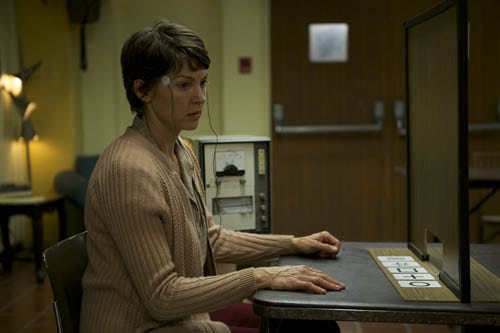
Did you do any research at all then for your character?
Well… no. I started to ‘cos I am a researcher, a reader and a studier. I just realised that the truth about this woman is what happens to her is due to her vulnerability and a physical accident. To me it became a much more physical exercise of figuring out, in your body with an injury, how something then comes into your body and how it would manifest itself and how it would take over and feel. So it became much more like an experiment and trying to figure out what that means. She didn’t go looking for this. She didn’t end up at the institute because it was something she went and found, so I thought the best thing I could do, research wise, was to just focus on physical work. I spent a lot of times breaking down the script in terms of how much of Judith there is in a moment and how much possession there is, and trying to balance that out.
Did you play Judith as two different personalities combined as one, or did you seperate them?
For me, it felt like trying to work out how grounded, how wounded, how much of yourself you are feeling, how in control and how out of control. How terrifying the feeling must be to be stuck in something… to be stuck inside your body and feel like there’s something else controlling you that’s not you.
Your character Judith hasn’t much dialogue in the movie, but she’s quite animated at times, particularly in the latter scenes of the movie. What inspired your movement when performing as Judith?
I started with a raised right shoulder and I felt like there was a vulnerability that climbs from the shoulder right into the back of the spine and all the movements and all the possession starts from there and ripples out. Judith says very little and she has a silent presence. Also, I focused in exercising stillness and then exercising crazy in a familiar version.
For the possessed voice of Judith, were elements of your voice used at all or was it created independently?
I think it all started with my voice and then they made adjustments, but I’d have to ask Chris.
The Atticus Institute writer and director Chris Sparling is known for his intense themes in his writing work. How was it working with him?
He’s terrific. He was so open. William and I had a couple of things we rehearsed with him which was fantastic and made a huge difference. He’s very focused. I mean, he really knew what he wanted and what he was trying to build. He’s super smart.
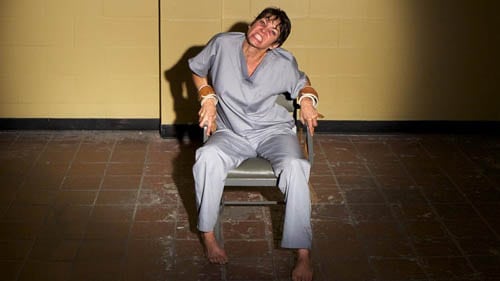
Was The Atticus Institute always set out to be a documentary style with flashbacks?
Yeah, that was always the idea. As a matter of fact, all of that was in the first script that I read. We went back and did some additional reshoots but that was just upon editing where he realised there was a little hole and needed a little more here. We shot it so fast for very little money. I’m trying to think of how many different cameras we used because each scene we shot on camera – often on a video camera, like a little, handheld, old school video camera – and then we shot everything with a still camera. So we would literally redo the entire scene for a still camera. So once we figured it out and started, we did it for a bunch of different cameras and we just had to go through the whole thing. We performed as hard and emotionally for the still camera as we did for the visual camera. I’ve never done anything where the stills and the other components were as important. In some ways, they make it work.
It’s brilliant. I thought that the still photographs told as much of the story as the moving footage…
Right, once you put the still photographs in with the voice overs and the stories, it’s really kind of incredible.
The handheld syle really captured the 70’s vibe. Speaking of which, how did you find the 70’s fashion?
Oh, isn’t it fantastic?! [laughs]. When I went in for my wardrobe for the costume fittings, I started picking clothes and figuring out what to take home, and I showed my husband and I said “this… now this is going to be sexy”. [laughs] They’re so shapeless and they’re so perfect and they work. I love them. I think the costumes are fantastic. I think it’s very hard to do 70’s, particularly with a very low budget and have it not feel like you’re pretending to do the 70’s. I thought it felt so real and they did a great job.
I particularly liked the possession scenes because you could see that it was Judith being possessed and that there was a different entity inside of her. Recent possesion movies tend to go a bit over the top with CGI whereas The Atticus Institute was a much more realistic take.
I think we lose something with the CGI stuff. That’s something I spoke with Chris about. I don’t think we need any of that and he’s right, what he put in and where he put it. We wanted it to feel human.
Thank you very much Rya for your time.
The Atticus Institute is available on DVD and Blu-Ray.
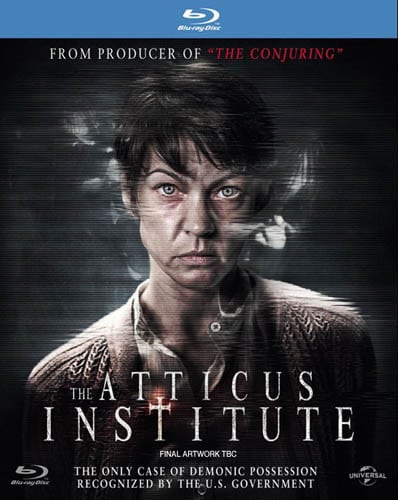
In the fall of 1976, a small parapsychology lab in Pennsylvania became the unwitting home to the only government-confirmed case of possession. The U.S. military assumed control of the lab under orders of national security and, soon after, implemented measures aimed at weaponizing the entity. The details of the inexplicable events that occurred are being made public after remaining classified for nearly forty years.

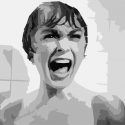
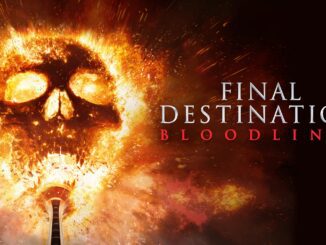
Be the first to comment